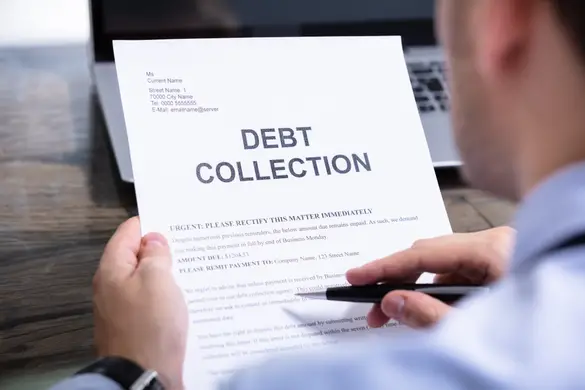
There are many ways for small businesses to pay debt collection agencies. Paying off debts responsibly and spotting potential scams eliminates significant legal and financial risks to a business. Of course, you can also implement risk assessment tools to evaluate your risks. Sometimes, debts don’t even need to be paid off at all. As a small business financial professional, paying off legitimate debt collection agencies significantly improves your credit score and enables more robust lending options. Read on to discover how to pay debt collection agencies for small businesses.
Verify The Debt
The first step in paying off any debt is to verify it as legitimate. Often, individuals pose as debt collectors to scam people out of money they didn’t owe in the first place. It’s also possible that the collector is legit, and that they just made a mistake. To get details on your debt, look at your credit reports. Contact both the lender and credit bureaus about any errors you notice to determine their legitimacy. If you have any questions, ask a credit counselor and a lawyer for guidance. This way, you eliminate the risk of being scammed and remedy any erroneous reports. Surely, verifying the debt as real is a first step in paying it back.
Determine Which Agency To Pay
Since your business isn’t involved in the assignment of debt to a collection company, you may not always know which agency is collecting your debt. One way of determining which agency to pay is to simply ask the lender the debt originates from. It’s possible your account was transferred to a third party, in which case the lender is unable to help. Many collection agencies report to the credit bureaus, so a recent business credit report may provide the contact information you need. Additionally, reputable debt collectors leave voicemails with their contact information if you miss their call. Call them back, or simply wait for them to call again. Absolutely, avoid paying the wrong agency by determining which agency to pay before making any payments.
Know Your Legal Protections
When dealing with debt collectors, know your legal rights and protections. The Fair Debt Collection Practices Act (FDCPA) provides many protections, and many states have their own laws governing collections in addition to it. Under the FDCPA, collectors must provide the amount and original creditor as well as inform you of your right to dispute the debt in writing. This must be done within five days of first contact. Collectors also can’t take any action prohibited by law, so they can’t harass, threaten, or lie to you. Additionally, collectors must comply with your requests not to call the business line or to direct all communications through an attorney. Of course, knowing your protections provides avenues of safely paying your debt.
Set Up Payment Plans
If your debt is verified as accurate and valid, there’s no way out other than paying it off. Offer a lump-sum payment if you have the entire debt amount on hand. This is the quickest way to settle a debt and improve your credit score, since there’s little negotiation involved. If you don’t have the entire amount on hand, set up a payment plan. Most agencies are open to this, but get the details of the plan in writing. When learning how to budget your money, you can start by paying in steady, affordable amounts. Certainly, setting up a payment plan is one of the only ways to pay off a legitimate, accurate debt.
Negotiate Settlements
It may be possible to settle your debt for less than is owed. This results in fast payment of the debt and for less than the original amount, but comes with many risks. Often, collection agencies accept a partial payment as a settlement, and then sell the remaining debt to another collector. However, reputable debt collection agencies are typically open to negotiation. Use your persuasion skills to explain why your business can’t pay the debt in full. Depending on the amount of debt and time in collections, your collector may be willing to accept less payment. Whatever you agree upon, make sure to get it in writing. This way, you ensure the creditors and collectors will hold up their end of the bargain. Indubitably, negotiating a settlement provides reductions in debt amounts but carries significant risks.
Proper payment of debt collection agencies by small businesses can be done in a myriad of ways. One way involves verifying the debt as legitimate in a first step. Next, determine which agency is handling your debt to ensure their payment. Know your legal rights to protect yourself and your business from predatory collectors. With a verified, accurate debt, you’ll need to pay it off either in a lump-sum or via a payment plan. Finally, you may be able to negotiate a settlement for a reduced amount. When wondering how to pay off debt collection agencies as a small business, consider the steps described above.
 Business First Family Business, Accounting, Finance, Investing, Marketing And Management
Business First Family Business, Accounting, Finance, Investing, Marketing And Management